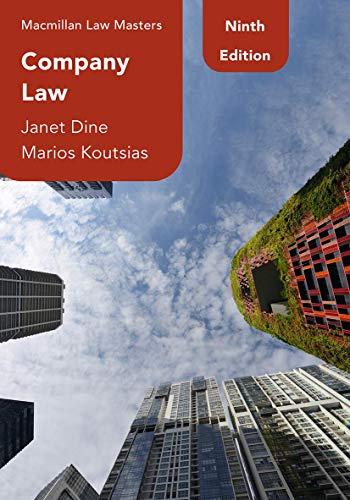Question
Fictitious Scenario: Margaret loved playing the lottery and played each week faithfully; this hobby also made her enter every contest that she could and over
Fictitious Scenario:
Margaret loved playing the lottery and played each week faithfully; this hobby also made her enter every contest
that she could and over the years, she won a few small prizes. One day, she received a phone call. She was told
that she won a free trip to British Columbia and that the only thing that she had to do was answer a skill-testing
question and agree to visit a time-share property while in Victoria. The caller explained that there would be no
obligation to sign up to any time-share contract. When she arrived in BC, there was a pamphlet provided at her
hotel check-in, with fine print explaining that there would be a $500 charge to visit the time-share if she did not
sign a time-share contract for at least one year. She did not carefully read the pamphlet's smaller printed terms.
She only noticed this charge to her credit card about two weeks after her return home. When she called to
complain, the time-share promoter plainly stated that she was told of this charge at the hotel and that there could
be no refund. She was wondering if she would be successful with a lawsuit to recover her money.
Please answer the related questions below with short answers.
a. Which case from this chapter in your assigned readings is most applicable to the situation described
above? (1, 2, 3 or 4)
1. Resch v. Canadian Tire Corporation, 2006 CanLII 11930 (ON SC), 17 BLR (4th) 301
[Note: Your instructor may assign this case as a Shared Writing activity.]
Resch purchased a bicycle for his stepson from a Canadian Tire dealership owned by Mills-Roy Enterprises Ltd. Because of a defective fork on the bike, the stepson was seriously injured in an accident, and he and his family brought this action against Canadian Tire, Mills-Roy (the dealership), and Procycle Group Inc. (the manufacturer).
Explain what course of action the various parties would have against each of the defendants and any arguments that could be raised in their defence. Explain the likely outcome. Would it make any difference to your answer to know that the stepson paid some funds toward the purchase of the bike?
2. R. v. Stucky, Ont. C.A., per Weiler and Gillese J.J.A., 2009 ONCA 151 (CanLII), 240 CCC (3d) 141
Stucky was involved in a direct mailing scheme centred in Ontario and aimed at subjects in the United States. These direct mailings contained false and misleading representations contrary to section 52(1) of the Competition Act. He was charged under that section in this action.
Explain any arguments that he might be able to raise in his defence. Does it make any difference where his potential victims reside? If this prosecution were unsuccessful under the Competition Act, is there any other legislation that can be used against him?
3. Behiel v. Primco Limited, 2011 SKQB 65 (CanLII)
When the Behiels bought flooring from Primco they informed the salesman, Lee, that they had young children and needed a product that would resist scratching, be durable, and be pleasing to the eye. He recommended the product ultimately purchased, stating it would meet or exceed those requirements. In fact, the floor was seriously scratched when furniture was moved on it. The Behiels complained and, when the supplier and manufacturer would do nothing, brought this action.
Assuming there was a restrictive covenant included prohibiting recovery for this type of damage, what would be the likelihood of success of this action? Note that this action was brought in Saskatchewan where there is a Sale of Goods Act and a Consumer Protection Act in place.
4. Muskoka Fuels v. Hassan Steel Fabricators Limited, 2011 ONCA 355 (CanLII)
Muskoka Fuels bought a 2000 L fuel storage tank from the manufacturer, Hassan Steel. The life expectancy of such a tank was at least 10 years in service. But five months after putting the tank into service, diesel fuel leaked out through a 0.5 cm hole r located at the bottom of the tank, causing damage totalling $71 589.34. The Court determined that Muskoka Fuels did nothing to cause the damage. The tank did not fail due to improper maintenance, had not been damaged during or after installation and had been properly installed and used only as intended. Instead, the hole in the tank was due to "microbially induced/influenced internal corrosion process" of unknown explanation.
Describe the cause of action available to Muskoka Fuels. Identify the applicable legislation. What remedy ought to be available?
b. Briefly explain the legal topic for which this case is discussed.
c. According to the results of this case, would Margaret's claim be successful? (Brief "yes", "no" or "maybe"
or "it depends" answer).
d. Name two facts in the Fictitious Scenario that are irrelevant to your conclusion in 3c.
Step by Step Solution
There are 3 Steps involved in it
Step: 1

Get Instant Access to Expert-Tailored Solutions
See step-by-step solutions with expert insights and AI powered tools for academic success
Step: 2

Step: 3

Ace Your Homework with AI
Get the answers you need in no time with our AI-driven, step-by-step assistance
Get Started


